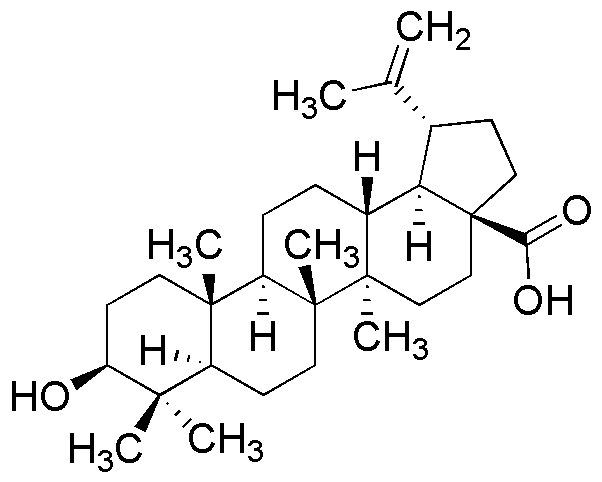Betulinic acid is widely utilized in research focused on:
- Pharmaceutical Development: Known for its anti-cancer properties, betulinic acid is being studied for its potential to induce apoptosis in various cancer cell lines, making it a promising candidate for new cancer therapies.
- Anti-Inflammatory Applications: This compound exhibits anti-inflammatory effects, which are beneficial in developing treatments for conditions such as arthritis and other inflammatory diseases, providing an alternative to conventional anti-inflammatory drugs.
- Skin Care Products: Due to its ability to promote skin regeneration and its antioxidant properties, betulinic acid is increasingly incorporated into cosmetic formulations aimed at anti-aging and skin repair.
- Antiviral Research: Betulinic acid has shown potential against various viruses, including HIV and herpes simplex virus, making it a subject of interest for researchers looking to develop antiviral medications.
- Natural Product Synthesis: As a naturally occurring compound, betulinic acid serves as a precursor in the synthesis of other bioactive molecules, facilitating the development of new drugs and therapeutic agents in the pharmaceutical industry.
General Information
Properties
Safety and Regulations
Applications
Betulinic acid is widely utilized in research focused on:
- Pharmaceutical Development: Known for its anti-cancer properties, betulinic acid is being studied for its potential to induce apoptosis in various cancer cell lines, making it a promising candidate for new cancer therapies.
- Anti-Inflammatory Applications: This compound exhibits anti-inflammatory effects, which are beneficial in developing treatments for conditions such as arthritis and other inflammatory diseases, providing an alternative to conventional anti-inflammatory drugs.
- Skin Care Products: Due to its ability to promote skin regeneration and its antioxidant properties, betulinic acid is increasingly incorporated into cosmetic formulations aimed at anti-aging and skin repair.
- Antiviral Research: Betulinic acid has shown potential against various viruses, including HIV and herpes simplex virus, making it a subject of interest for researchers looking to develop antiviral medications.
- Natural Product Synthesis: As a naturally occurring compound, betulinic acid serves as a precursor in the synthesis of other bioactive molecules, facilitating the development of new drugs and therapeutic agents in the pharmaceutical industry.
Documents
Safety Data Sheets (SDS)
The SDS provides comprehensive safety information on handling, storage, and disposal of the product.
Product Specification (PS)
The PS provides a comprehensive breakdown of the product’s properties, including chemical composition, physical state, purity, and storage requirements. It also details acceptable quality ranges and the product's intended applications.
Certificates of Analysis (COA)
Search for Certificates of Analysis (COA) by entering the products Lot Number. Lot and Batch Numbers can be found on a product’s label following the words ‘Lot’ or ‘Batch’.
*Catalog Number
*Lot Number
Certificates Of Origin (COO)
This COO confirms the country where the product was manufactured, and also details the materials and components used in it and whether it is derived from natural, synthetic, or other specific sources. This certificate may be required for customs, trade, and regulatory compliance.
*Catalog Number
*Lot Number
Safety Data Sheets (SDS)
The SDS provides comprehensive safety information on handling, storage, and disposal of the product.
DownloadProduct Specification (PS)
The PS provides a comprehensive breakdown of the product’s properties, including chemical composition, physical state, purity, and storage requirements. It also details acceptable quality ranges and the product's intended applications.
DownloadCertificates of Analysis (COA)
Search for Certificates of Analysis (COA) by entering the products Lot Number. Lot and Batch Numbers can be found on a product’s label following the words ‘Lot’ or ‘Batch’.
*Catalog Number
*Lot Number
Certificates Of Origin (COO)
This COO confirms the country where the product was manufactured, and also details the materials and components used in it and whether it is derived from natural, synthetic, or other specific sources. This certificate may be required for customs, trade, and regulatory compliance.


